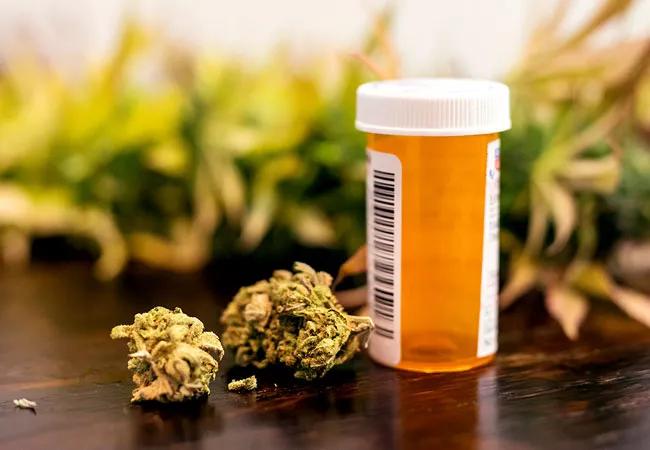Survey suggests need for evidence-based education among patients and providers alike

Many people with multiple sclerosis (MS) use cannabis, yet few rely on their MS physicians for information about it, according to a nationwide survey led by Cleveland Clinic researchers. Nearly half the survey respondents said their primary source of medical guidance about the drug was themselves —or nobody.
Advertisement
Cleveland Clinic is a non-profit academic medical center. Advertising on our site helps support our mission. We do not endorse non-Cleveland Clinic products or services. Policy
“Patients with MS may not think to turn to their physicians for information about cannabis because it’s not a prescription drug,” says the study’s senior author, Robert Fox, MD, staff neurologist with Cleveland Clinic’s Mellen Center for Multiple Sclerosis Treatment and Research. “Physicians, in turn, generally aren’t knowledgeable about specific cannabis products or data regarding efficacy, safety, dosing and patient selection.”
The study report, published online in Neurology: Clinical Practice, details findings of a survey of patients with MS about ∆9-tetrahydrocannabinol-containing cannabis. The survey, conducted in March-April 2020, was administered by invitation to active U.S. participants (N = 6,934) in the North American Research Committee on Multiple Sclerosis (NARCOMS) Registry.
Overall, 3,249 participants (47%) responded. Respondents were predominantly female (78.5%) and white (88.5%), and 62.5% were taking disease-modifying therapy for their MS. The respondent cohort had a mean age of 61.3 years, mean age at MS symptom onset of 31.2 years and median disability level of 3-Gait Disability.
Thirty-one percent of respondents reported ever having used cannabis to treat MS symptoms; of these, 20% currently used it.
Among respondents overall, 76.1% lived in a state where cannabis was currently legal. Cannabis ever-users were more likely than never-users to live in such a state (81.5% vs. 73.7%; P < 0.0001).
The survey was designed to explore registry participants’ sources of information about cannabis for MS, their perceptions of dialogue with healthcare providers about cannabis use, and their sources of cannabis products and information on their contents.
Advertisement
Among cannabis ever-users, the users themselves or “nobody” was most often cited as the primary source of medical guidance about the drug (48% of responses), followed by a cannabis dispensary professional (21%). Only 12% of users primarily relied on their MS physician, although 70% had discussed cannabis with that medical professional, and an additional 13% cited another physician, a pharmacist or another healthcare provider.
More than half of overall survey respondents (56%) said they would be very comfortable discussing cannabis use for symptom management with their MS physician. When asked if they thought their MS physician would be comfortable if they used cannabis for MS, 34% of current nonusers and 22% of current users said no.
“It’s concerning that a substantial fraction of MS patients are unlikely to seek guidance about cannabis from their physician,” says Dr. Fox. “This seems to be linked to a sense that the physician would be uncomfortable with their patients’ use of the drug. That was largely the case among respondents in states where cannabis was not legal currently.”
Among current users of cannabis, 62% typically obtained it from a dispensary, with most others getting it from a family member or friend (18%) or from an acquaintance (13%). Dispensaries were the most common source of information on cannabis contents (39%), followed by word of mouth/dealer/friend (29%) and unregulated product labels (24%). Perceived quality and safety was the leading factor driving choice of cannabis product among current users, cited by 70%, followed by access to preferred THC and/or CBD potencies/formulations (40%), location (39%) and sales support (31%).
Advertisement
“The possibility of pharmacologic interactions with cannabis is high because CBD and THC affect common targets for drug metabolism,” says Dr. Fox. “Additionally, cannabis can have unintended side effects. This is why it’s important that physicians know about their patients’ use of cannabis for MS and that patients feel comfortable talking about it with their MS physician.”
The main practical implications of the survey findings, according to Dr. Fox, are twofold: evidence-based education around cannabis is needed for physicians and patients with MS, and physicians need to take a more active role in providing medical guidance about cannabis.
Advertisement
Advertisement

Aim is for use with clinician oversight to make screening safer and more efficient

Rapid innovation is shaping the deep brain stimulation landscape

Study shows short-term behavioral training can yield objective and subjective gains

How we’re efficiently educating patients and care partners about treatment goals, logistics, risks and benefits

An expert’s take on evolving challenges, treatments and responsibilities through early adulthood

Comorbidities and medical complexity underlie far more deaths than SUDEP does

Novel Cleveland Clinic project is fueled by a $1 million NIH grant

Tool helps patients understand when to ask for help